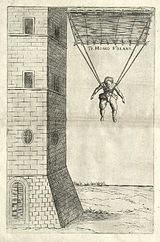Difference between revisions of "Fausto Veranzio"
m (ref tweak) |
(ref: The History of the Decline and Fall of the Roman Empire, Volume 1) |
||
| Line 4: | Line 4: | ||
{{Cquote|'''Wikipedia states''': '' ... was a polymath and bishop from Croatia.'' <ref>{{cite web|url=http://en.wikipedia.org/wiki/Fausto_Veranzio|title=Wikipedia: Fausto Veranzio|date=[[2010]]|accessdate=2010-10-04}}</ref> (3rd of October 2010)}} It '''must''' be stated that this man was from the ''Republic of Venice'' not from Croatia, because Croatia as a sovereign state did '''not exist''' for at least three hundred years after his time. | {{Cquote|'''Wikipedia states''': '' ... was a polymath and bishop from Croatia.'' <ref>{{cite web|url=http://en.wikipedia.org/wiki/Fausto_Veranzio|title=Wikipedia: Fausto Veranzio|date=[[2010]]|accessdate=2010-10-04}}</ref> (3rd of October 2010)}} It '''must''' be stated that this man was from the ''Republic of Venice'' not from Croatia, because Croatia as a sovereign state did '''not exist''' for at least three hundred years after his time. | ||
[[File:160px-Fausto Veranzio homo volans.jpg|thumb|right|270px|Fausto Veranzio parachute design]] | [[File:160px-Fausto Veranzio homo volans.jpg|thumb|right|270px|Fausto Veranzio parachute design]] | ||
| − | This is using Wikipedia for blatant nationalistic propaganda and is not based on fact, otherwise it ruined a ''perfectly'' good article on this unique individual. Fausto was born in Sibenik circa 1551 in | + | This is using Wikipedia for blatant nationalistic propaganda and is not based on fact, otherwise it ruined a ''perfectly'' good article on this unique individual. Fausto was born in Sibenik circa 1551 in ''Dalmatia'', a region of Republic of Venice in todays modern Croatia. In the 19th century it became a province of the [[Austria|Austro]]-Hungarian Empire (Dalmatia as a region, dates back to the Roman Empire).<ref>[http://books.google.com.au/books?id=j-0LAAAAYAAJ&pg=PA158&dq=Roman+empire+province+Dalmatia&hl=en&ei=jfupTJO8JYuSuwO49cTJDA&sa=X&oi=book_result&ct=result&resnum=2&ved=0CDMQ6AEwAQ#v=onepage&q=Roman%20empire%20province%20Dalmatia&f=false The History of the Decline and Fall of the Roman Empire, Volume 1] by Edward Gibbon (p158)</ref> |
*'''Encyclopedia Britannica'''-Dalmatia: | *'''Encyclopedia Britannica'''-Dalmatia: | ||
{{Cquote| | {{Cquote| | ||
| − | *Venetian rule, established in 1420 when the king of Croatia, Ladislas of Naples, ceded the country to the '''Venetian republic''', ended in 1797. This period was marked by Venetian warfare against the Turks. When the French gave Venice to [[Austria]] under the Treaty of Campo Formio (1797), Dalmatia became Austrian also; but in 1805, under the Treaty of Pressburg, Austria had to cede Dalmatia to Napoleon. It was returned to Austria after Napoleon’s fall and remained an Austrian crownland until 1918. | + | *Venetian rule, established in 1420 when the king of Croatia, Ladislas of Naples, ceded the country to the '''Venetian republic''', ended in 1797. This period was marked by Venetian warfare against the Turks. When the French gave Venice to [[Austria]] under the Treaty of Campo Formio (1797), '''Dalmatia''' became Austrian also; but in 1805, under the Treaty of Pressburg, Austria had to cede '''Dalmatia''' to Napoleon. It was returned to Austria after Napoleon’s fall and remained an Austrian crownland until 1918. |
| − | *Finally, the Treaty of Rapallo (Nov. 12, 1920) between [[Italy]] and Yugoslavia gave all Dalmatia to the Yugoslavs except the mainland Zadar (Italian: Zara) enclave and the coastal islands of Cres, Losinj (Lussino), and Lastovo. <ref>'''Encyclopedia Britannica''': Dalmatia</ref>}} | + | *Finally, the Treaty of Rapallo (Nov. 12, 1920) between [[Italy]] and Yugoslavia gave all '''Dalmatia''' to the Yugoslavs except the mainland Zadar (Italian: Zara) enclave and the coastal islands of Cres, Losinj (Lussino), and Lastovo. <ref>'''Encyclopedia Britannica''': Dalmatia</ref>}} |
== See also == | == See also == | ||
*[[Directory:The Wikipedia Point of View#History|The Wikipedia Point of View]] | *[[Directory:The Wikipedia Point of View#History|The Wikipedia Point of View]] | ||
Revision as of 16:16, 4 October 2010
This is about Wikipedia's article on Fausto Veranzio.
Fausto Veranzio (or Faust Vrancic)[1] is another article on Wikipedia that exhibits nationalistic editing. Fausto Veranzio was historically a citizen of the Republic of Venice in the 16th and 17th century. He does have a Croatian background through family lineage. He was a brilliant scientist in his day and is noted for his invention of the parachute.
| “ | Wikipedia states: ... was a polymath and bishop from Croatia. [2] (3rd of October 2010) | ” |
It must be stated that this man was from the Republic of Venice not from Croatia, because Croatia as a sovereign state did not exist for at least three hundred years after his time.
This is using Wikipedia for blatant nationalistic propaganda and is not based on fact, otherwise it ruined a perfectly good article on this unique individual. Fausto was born in Sibenik circa 1551 in Dalmatia, a region of Republic of Venice in todays modern Croatia. In the 19th century it became a province of the Austro-Hungarian Empire (Dalmatia as a region, dates back to the Roman Empire).[3]
- Encyclopedia Britannica-Dalmatia:
| “ |
|
” |
See also
- The Wikipedia Point of View
- The Wikipedia Point of View/Activists
- Worst of Wikipedia
- Top 10 Reasons Not to Donate to Wikipedia
References
- ^ Pronounced in Croatian: Vranchic or Vrančić
- ^ <templatestyles src="Module:Citation/CS1/styles.css"></templatestyles>"Wikipedia: Fausto Veranzio". 2010. Retrieved 2010-10-04. Check date values in:
|date=(help) - ^ The History of the Decline and Fall of the Roman Empire, Volume 1 by Edward Gibbon (p158)
- ^ Encyclopedia Britannica: Dalmatia
External links
- Francesco Patrizi: BEYOND NECESSITY- Francesco Patrizi link
The case of Francesco Patrizi, the Venetian philosopher, is a fine illustration of the nationalistic warfare that infests Wikipedia, and the inaccuracy and distortion and bias that follows as a result.
| “ | Quote by Ocham-London, United Kingdom:The problem becomes particularly acute in a place like Wikipedia, where the only intellectual interest - that is to say, no intellectual interest at all - lies simply in a nationalistic dispute, in this case between Italians and Croatians. | ” |
<sharethis />
